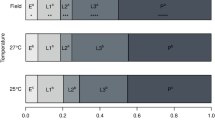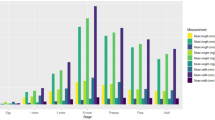Abstract
Developmental curves for Chrysomya albiceps (Wiedemann) (Diptera: Calliphoridae) were established at 13 different constant temperatures using developmental landmarks and length as measures of age. The thermal summation constants (K) and developmental zeros (D 0) were calculated for five developmental landmarks using the method described by Ikemoto and Takai (Environ Entomol 29:671–682, 2000). Comparison with the K and D 0 values of our findings to those of three previously published studies of C. albiceps suggests that K is directly proportional to geographic latitude, and D 0 is inversely proportional to both K and geographic latitude. Body size and developmental landmarks have a complex relationship because of trade-offs between mortality risk and female fecundity (as measured by body size) at non-optimal temperatures. This relationship can be summarized using superimposed isomorphen and isomegalen diagrams, which can then be used to make forensic estimates of postmortem intervals from larval body lengths. Finally, we recommend that future studies providing data for precise forensic estimates of postmortem intervals should use a relative temporal precision of about 10% of the total duration being measured. For many blowflies, this translates into a sampling interval of approximately every 2 h before hatching, 3 h before first ecdysis and 6 h before second ecdysis.




Similar content being viewed by others
Reference
Angus JF, Cunningham RB, Moncur MW, MacKenzie DH (1981) Phasic development in field crops I. Thermal response in the seeding phase. Field Crops Res 3:365–387
Bonhomme R (2000) Bases and limits to using ‘degree day’ units. Eur J Agronomy 13:1–10
Braack LEO, Retief PF (1986) Dispersal, density and habitat preference of the blow-flies Chrysomyia albiceps (WD.) and Chrysomyia marginalis (WD.) (Diptera: Calliphoridae). Onderstepoort J Vet Res 53:13–18
Byrd JH, Allen JC (2001) Computer modeling of insect growth and its application to forensic entomology. In: Byrd JH, Castner JL (eds) Forensic Entomology: the utility of arthropods in legal investigations. CRC Press, New York, p 418
Charnov EL, Gillooly JF (2003) Thermal time: body size, food quality and the 10°C rule. Evol Ecol Res 5:43–51
Clark K, Evans L, Wall R (2006) Growth rates of the blowfly, Lucilia sericata, on different body tissues. Forensic Sci Int 156:145–149
Craufurd PQ, Roberts EH Summerfield RJ (1996) The influence of temperature on seed germination rate in grain legumes. I. A comparison of chickpea, lentil, soyabean and cowpea at constant temperatures. J Exp Bot 37:705–715
Dadour IR, Cook DF, Fissioli JN, Bailey WJ (2001) Forensic entomology: application, education and research in Western Australia. Forensic Sci Int 120:48–52
Davies L, Ratcliffe GG (1994) Development rates of some pre-adult stages in blowflies with reference to low temperatures. Med Vet Entomol 8:245–254
Gaudry E, Myskowiak JB, Chauvet B, Pasquerault T, Lefebvre F, Malgorn Y (2001) Activities of the forensic entomology department of the French Gendarmerie. Forensic Sci Int 120:68–71
Goodbrod JR, Goff ML (1990) Effects of larval population density on rates of development and interactions between two species of Chrysomya (Diptera: Calliphoridae) in laboratory culture. J Med Entomol 27:338–343
Grassberger M, Reiter C (2001) Effect of temperature on Lucilia sericata (Diptera: Calliphoridae) development with special reference to the isomegalen- and isomorphen-diagram. Forensic Sci Int 120:32–36
Grassberger M, Reiter C (2002) Effect of temperature on development of the forensically important holarctic blow fly Protophormia terraenovae (Robineau-Desvoidy) (Diptera: Calliphoridae). Forensic Sci Int 128:177–182
Grassberger M, Friedrich E, Reiter C (2003) The blowfly Chrysomya albiceps (Wiedemann) (Diptera: Calliphoridae) as a new forensic indicator in central Europe. Int J Legal Med 117:75–81
Greenberg B, Kunish JC (2002) Entomology and the law: flies as forensic indicators. Cambridge University Press, Cambridge, UK, p 306
Higley LG, Haskel NH (2001) Insect development and forensic entomology. In: Byrd JH, Castner JL (eds) Forensic entomology: the utility of arthropods in legal investigations. CRC Press, Roca Baton, pp 287–302
Honêk A (1996a) Geograpical variation in thermal requirements for insect development. Eur J Entomol 93:303–12
Honêk A (1996b) The relationship between thermal constants for insect development: a verification. Acta Soc Zool Bohem 60:115–152
Honêk A (1999) Constraints on thermal requirements for insect development. Entomol Sci 2:615–621
Honêk A, Kocourek F (1988) Thermal requirements for development of aphidophagous Coccinellidae (Coleoptera), Chrysopidae, Hemerobiidae (Neuroptera), and Syrphidae (Diptera): some general trends. Oecologia 76:455–460
Ikemoto T, Takai K (2000) A new linearized formula for the law of total effective temperature and the evaluation of line-fitting methods with both variables subject to error. Environ Entomol 29:671–682
Ireland S, Turner B (2006) The effects of larval crowding and food type on the size and development of the blowfly, Calliphora vomitoria. Forensic Sci Int 159:175–181
Kaneshraja G, Turner B (2004) Calliphora vicina larvae grow at different rates on different body tissue. Int J Legal Med 118:242–244
Laurence BR (1981) Geographical expansion of the range of Chrysomya blowflies. Trans R Soc Trop Med Hyg 75:130–131
Lefebvre F, Pasquerault T (2004) Temperature-dependent development of Ophyra aenescens (Wiedemann, 1830) and Ophyra capensis (Wiedemann, 1818) (Diptera, Muscidae). Forensic Sci Int 139:75–79
Marchenko M (1988) Medico-legal relevance of cadaver entomofauna for the determination of the time since death. Acta Med Legal Soc 38:257–302
Marchenko M (2001) Medicolegal relevance of cadaver entomofauna for the determination of the time of death. Forensic Sci Int 120:89–109
Nishida K, Shinonaga S, Kano R (1986) Growth tables of fly larvae for the estimation of postmortem intervals. Ochanomizu Med J 34:157–172
O’Flynn MA (1983) The succession and rate of development of blowflies in carrion in southern Queensland and the application of these data to forensic entomology. J Aust Entomol Soc 22:137–147
Povolný D (2002) Chrysomya albiceps (Wiedemann, 1819): the first case in central Europe involving this blowfly (Diptera: Calliphoridae). Acta U Agr Silvi Mendelianae Brunensis 50:105–112
Prins AJ (1982) Morphological and biological notes on six South African blow-flies (Diptera: Calliphoridae) and their immature stages. Ann S Afr Mus 90:201–217
Qi A, Wheeler TR, Keating DH, Ellis RH, Summerfield RJ, Craufurd PQ (1999) Modelling the effects of temperature on the rates of seedling emergence and leaf appearance in legume cover crops. Exp Agr 35:327–344
Queiroz MMC (1996) Temperature requirements of Chrysomya albiceps (Wiedemann, 1819) (Diptera, Calliphoridae) under laboratory conditions. Mem Inst Oswaldo Cruz 91:785–788
Romoser WS, Stoffolano JG (1998) The science of entomology, 4th edn. McGraw Hill, Singapore
Sharpe PJH, DeMichele DW (1977) Reaction kinetics of poikilotherm development. J Theor Biol 64:649–670
Trudgill DL (1994) An assessment of the relevance of thermal time relationships to nematology. Fund Appl Nematol 18:407–417
Trudgill DL (1995) Why do tropical poikilothermic organisms tend to have higher threshold temperature for development than temperate ones. Funct Ecol 9:136–137
Trudgill DL, Perry JN (1994) Thermal time and ecological strategies—a unifying hypothesis. Ann Appl Biol 125:521–532
Trudgill DL, Honêk A, Van Straalen NM (2005) Thermal time—concepts and utility. Ann Appl Biol 146:1–14
Ulyett GC (1950) Competition for food and allied phenomena in sheep-blowfly populations. Philos Trans R Soc B 234:77–174
Verves YuG (2004) Records of Chrysomya albiceps in the Ukraine. Med Vet Entomol 18:308–310
Villet MH (2006) An inexpensive geometrical gauge for measuring small, live insects quickly without harming them. Entomol Exp Appl 122:279–280
Wells JD, King J (2001) Incidence of precocious egg development in flies of forensic importance (Calliphoridae). Pan-Pac Entomol 77:235–239
Wells JF, LaMotte LR (1995) Estimating maggot age from weight using inverse prediction. J Forensic Sci 40:585–590
Zumpt F (1965) Myiasis in man and animals in the old world: a textbook for physicians veterinarians and zoologists. Butterworth, London
Acknowledgements
We thank Sue Abraham for assistance with graphics, Kierryn Gendall for laboratory assistance, the South African National Research Foundation (NRF) and Rhodes University for financing this project. Any opinion, findings, and conclusions or recommendations expressed in this material are those of the author and do not necessarily reflect the views of the National Research Foundation.
Author information
Authors and Affiliations
Corresponding author
Rights and permissions
About this article
Cite this article
Richards, C.S., Paterson, I.D. & Villet, M.H. Estimating the age of immature Chrysomya albiceps (Diptera: Calliphoridae), correcting for temperature and geographical latitude. Int J Legal Med 122, 271–279 (2008). https://doi.org/10.1007/s00414-007-0201-7
Received:
Accepted:
Published:
Issue Date:
DOI: https://doi.org/10.1007/s00414-007-0201-7




